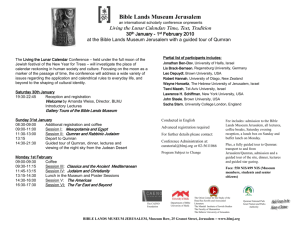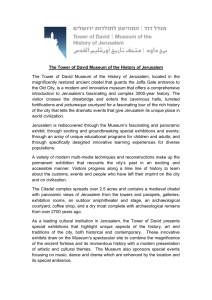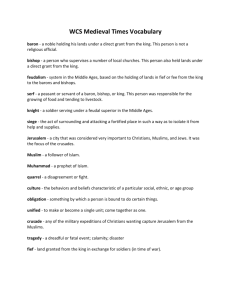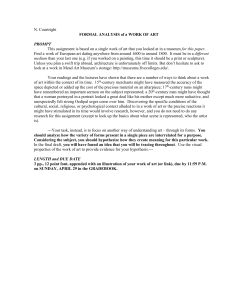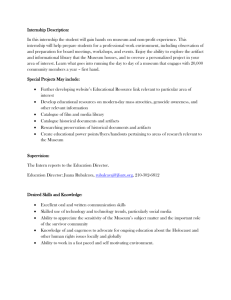Program - Orion Center for the Study of the Dead Sea Scrolls
advertisement
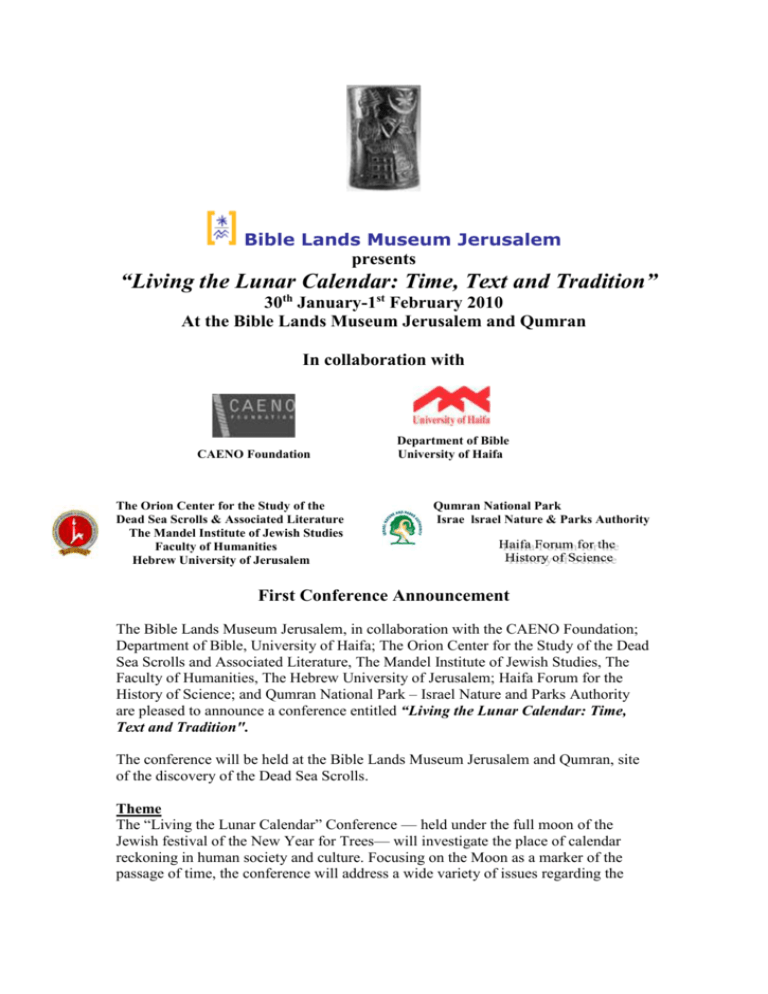
Bible Lands Museum Jerusalem presents “Living the Lunar Calendar: Time, Text and Tradition” 30th January-1st February 2010 At the Bible Lands Museum Jerusalem and Qumran In collaboration with CAENO Foundation The Orion Center for the Study of the Dead Sea Scrolls & Associated Literature The Mandel Institute of Jewish Studies Faculty of Humanities Hebrew University of Jerusalem Department of Bible University of Haifa Qumran National Park Israe lsrael Nature & Parks Authority First Conference Announcement The Bible Lands Museum Jerusalem, in collaboration with the CAENO Foundation; Department of Bible, University of Haifa; The Orion Center for the Study of the Dead Sea Scrolls and Associated Literature, The Mandel Institute of Jewish Studies, The Faculty of Humanities, The Hebrew University of Jerusalem; Haifa Forum for the History of Science; and Qumran National Park – Israel Nature and Parks Authority are pleased to announce a conference entitled “Living the Lunar Calendar: Time, Text and Tradition". The conference will be held at the Bible Lands Museum Jerusalem and Qumran, site of the discovery of the Dead Sea Scrolls. Theme The “Living the Lunar Calendar” Conference — held under the full moon of the Jewish festival of the New Year for Trees— will investigate the place of calendar reckoning in human society and culture. Focusing on the Moon as a marker of the passage of time, the conference will address a wide variety of issues regarding the application of astronomical and calendrical rules to everyday life, and beyond to the shaping of cultural identity. The lunar calendar with its irregular pattern of 29/30 day months, requiring an uneven number of months to match the passage of an annual solar/stellar cycle brings with it a measure of uncertainty. It can be observed that the Moon is at one and the same time both constant and unpredictable, leading civilizations to adopt divergent modes of reflection on the stable and unstable components of their existence in time. With the Moon, time does not only exist in nature, but needs to be regulated by man. Human measures of day, month, and year, must live with these uncertainties. In cultures that use the lunar calendar, one must find answers to such mundane questions as: “When does the month, the year, begin? How are salaries and interest to be calculated over months of uneven length and years of unequal months? Is the date in one city the same in all cities?” More generally, cultures had to account for the apparent anomaly in nature, defining just how much human involvement is required in fixing the central concepts of time. This ideological dilemma joined forces with the political and societal conflicts in antiquity, both within the great empires as well as smaller ethnic and cultural entities. The calendar thus participated significantly in the formation of civilization and identity. Conference Program Saturday 30th January Evening welcome, registration, lectures and gallery tour of the Bible Lands Museum Jerusalem Sunday 31st January Lectures dedicated to Mesopotamia, Egypt, and Early Judaism. Guided tour to Qumran, including buses to and from Jerusalem, entrance fees to the site, a selection of guided tours led by some of the foremost experienced guides, a guided viewing of the night sky, packed lunch, dinner and a lecture. Monday 1st February Sessions entitled Classics and the Ancient Mediterranean, Judaism, Christianity, the Americas, the Far East and Beyond. The conference will be conducted in English. The lectures are to be given by some of the major international scholars in the field. Confirmed participants include Jonathan Ben-Dov (Haifa University) Wayne Horowitz (Hebrew University of Jerusalem) Stanislaw Iwaniszewski (National Institute of Anthropology and History, Mexico) Shalom Paul (Hebrew University of Jerusalem and The Orion Center for the Study of the Dead Sea Scrolls and Associated Literature) Lawrence Schiffman (New York University) John Steele (Brown University) Sacha Stern (University College London) Registration and Payment The fees for conference, including the tour are as follows: 549 NIS ($137) 499 NIS ($125) (Museum members, students and senior citizens) The fee includes a fully guided tour to Qumran on the Sunday: transport to and from Jerusalem/Qumran, admission to Qumran and a guided tour of the site, followed by dinner in the evening. The fee also includes admission to the Bible Lands Museum Jerusalem, lectures, coffee breaks, a reception on Saturday evening, a packed lunch on the Sunday and a buffet lunch on the Monday. It is possible to attend the lectures only on Saturday evening, Sunday morning and all day Monday. This fee includes admission to the Bible Lands Museum Jerusalem, lectures, coffee breaks, a reception on Saturday evening and a buffet lunch on the Monday. It does not include the tour to Qumran. The cost for this option is: 250 NIS ($63) 200 NIS ($50) (Museum members, students and senior citizens) Payment information Please make checks or money orders payable to: Remit payment to: Or, payments may be made via bank transfer: SWIFT/IBAN Bible Lands Museum Jerusalem Bible Lands Museum Jerusalem P.O.B. 4670, Jerusalem 91046, Israel Bible Lands Museum Jerusalem Account No.: 180580 Sort Code: 11-067 Israel Discount Bank, LTD. 220 Jaffa Street, Jerusalem 94383, Israel IDBLILIT067JLM180580 Payment may also be made by credit card. If you choose this payment method, please ensure that you quote credit card no., full name of card holder and expiry date of card. Registration will take place at the Bible Lands Museum on Saturday 30th January 2010 from 19.00-20.00 hours and on Sunday 31st January from 08.30-09.00 hours. Location The Bible Lands Museum Jerusalem houses one of the world’s most exceptional collections of artefacts from the Ancient Near East illustrating the civilizations of the biblical period, including Mesopotamia, Egypt, Phoenicia, Greece and Rome. The museum is situated on Museum Row, 25 Granot Street, and is close to the Givat Ram campus of the Hebrew University of Jerusalem, The Israel Museum and the Bloomfield Science Museum. It is served by the 9, 17, 24 and 99 bus routes. The museum is accessible to the disabled. Arrival from Abroad Ben-Gurion International Airport is approximately 50 km (31 miles) west of Jerusalem. Depending on the time of day, it is a 40-55 minute journey between the airport and Jerusalem. The airport lies on Route no.1 which links Tel-Aviv and Jerusalem. Public Transport Buses operated by the Egged Co-operative run to Jerusalem Central Bus Station. They depart from the main terminal (terminal 3) on the second level next to gates 21and 23. Please check the Egged website for bus times www.egged.co.il/Eng Taxis to all destinations are located on ground floor level and reached by exiting the arrivals hall. A taxi rank and dispatcher’s station will assist you in locating a taxi. In addition Nesher Tours runs a shared taxi service (sherut) based on a fixed rate per passenger between the airport and your hotel in Jerusalem. The shared taxi departure point is also located on the ground floor by exiting the arrivals hall. Accommodation The Bible Lands Museum Jerusalem has the following special rates at the Little House in Rehavia Hotel. The hotel is approximately 30 minutes walk from the museum. Alternatively, the museum can be reached by local bus or taxi. Single room with private bathroom facilities- $79 per night Double room with private bathroom facilities - $99 per night Rates include buffet breakfast. If you would like us to book you a room at this facility, please contact us. If you would like alternative recommendations for accommodation, we shall be happy to assist. However, reservations for alternative accommodation should be made by participants directly with the hotel and not via the museum. Contact Details and Further information Bible Lands Museum Jerusalem POB 4670 Jerusalem 91046 Israel Tel: 972-(0)2-561 1066 Fax: 972-(0)2-563 8228 Museum website: www.blmj.org Conference website: To request a registration form please contact the conference administrator, Carolyn Budow Ben-David at curatorial@blmj.org *All programs subject to change Cylinder seal depicting the god Enki/Ea with the moon and a star, on display in The Sumerian Temple: Gallery at the Bible Lands Museum Jerusalem. Photo: David Loggie.
